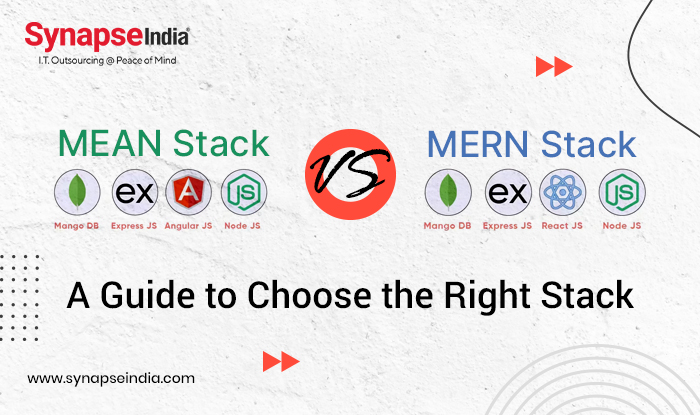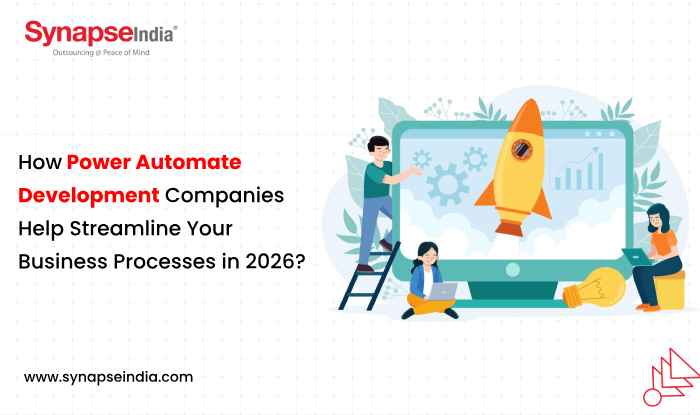MEAN Stack vs MERN Stack - A Guide to Choose the Right Stack
 05 Jan 2024
05 Jan 2024
MEAN uses AngularJS, while MERN uses React. Apart from that, MEAN stack uses MongoDB as its database, while the MERN stack uses MongoDB or any other NoSQL database.
MEAN Stack: A Brief Introduction
MEAN stack is an acronym for Mongo, DB, Angular JS, Node JS, and Express JS, which represents a dynamic full-stack development framework. MongoDB serves as the NoSQL database, express JS manager, server, site, application, logic, angular JS, power, and the front, and with its dynamic user interface Node JS facilitates server site execution using Javascript. In this blog, we will discuss about MEAN stack vs MERN stackand its functionalities.
MERN Stack: A Brief Introduction
The MERN stack includes technologies like MongoDB, Express.js, React, and Node.js, quantifying a powerful and popular full-stack development framework. MongoDB serves as the NoSQL database, whereas, Express.js handles server-side application logic, React powers the dynamic user interface on the front end, and Node.js facilitates server-side execution using JavaScript. MERN stack enables developers to create feature-rich and scalable web applications.
MEAN vs MERN: Which one to choose?
Choosing between MEAN and MERN depends on specific project requirements, team expertise, and development preferences.
MEAN Stack is preferable when:
- AngularJS Experience: If your team has expertise in AngularJS and prefers its features for building dynamic web applications.
- All-in-One Solution: MEAN provides an all-in-one solution with AngularJS for the front end, making it suitable for developers who prefer a comprehensive framework.
MERN Stack is a better fit when:
- React Preference: If your team prefers React for its component-based architecture, virtual DOM, and extensive ecosystem.
- Modularity: React's modular nature allows for greater flexibility and ease of integration with other libraries or frameworks.
- Community and Ecosystem: React has a large and active community, resulting in a vast ecosystem of libraries and tools.
Ultimately, the choice between MEAN or MERN depends on your team's expertise, project requirements, and preferred JavaScript framework for front-end development. Consider factors like familiarity, project complexity, scalability, and community support when deciding.
MEAN Stack and MERN Stack: Features and Use Cases
MEAN Stack (MongoDB, Express.js, AngularJS, Node.js) and MERN Stack (MongoDB, Express.js, React, Node.js) are both popular lamp stack JavaScript frameworks, each with its unique features and ideal use cases.
1. MEAN Stack:
a. MongoDB
- Feature: NoSQL database with flexible, JSON-like documents.
- Use Cases: Suitable for applications with rapidly changing or evolving schemas.
b. Express.js:
- Feature: Lightweight and flexible web application framework for Node.js.
- Use Cases: Ideal for building scalable and robust server-side applications.
c. AngularJS:
- Feature: Frontend JavaScript framework for building dynamic, single-page applications.
- Use Cases: Well-suited for large-scale applications requiring a modular and structured front end.
d. Node.js:
- Feature: Server-side JavaScript runtime for building fast and scalable network applications.
- Use Cases: Great for real-time applications and microservices architecture.
2. MERN Stack:
a. MongoDB
- Feature: NoSQL database with scalability and flexibility.
- Use Cases: Ideal for applications requiring scalable and high-performance databases.
b. Express.js:
- Feature: Minimal and flexible Node.js web application framework.
- Use Cases: Well-suited for developing RESTful APIs and server-side applications.
c. React:
- Feature: JavaScript library for building user interfaces with a component-based architecture.
- Use Cases: Suitable for building interactive and responsive user interfaces in single-page applications.
d. Node.js:
- Feature: Server-side JavaScript runtime for building scalable network applications.
- Use Cases: Excellent for building real-time applications and scalable server-side components.
3. Common Features:
- JavaScript: Both stacks use JavaScript throughout the entire application stack, simplifying development and fostering code reuse.
- Node.js: Both lamp stacks leverage Node.js for server-side development, allowing for efficient and scalable applications.
4. Use Case Considerations:
- MEAN Stack: Ideal for projects that require a comprehensive frontend framework (AngularJS) and a powerful backend (Node.js, Express.js).
- MERN Stack: Suitable for projects where React's component-based architecture is preferred for building dynamic and interactive user interfaces.
MEAN Stack vs MERN Stack: A Quick Comparison
| Features | MEAN Stack | MERN Stack | LAMP Stack | Django Stack |
| Database | MongoDB | MongoDB | MySQL | PostgreSQL |
| Backend Framework | Express.js | Express.js | PHP | Django |
| Frontend Framework | Angular | React | Not Included | Not Included |
| Server Runtime | Node.js | Node.js | Apache | Python |
| Language | JavaScript | JavaScript | PHP | Python |
| Scalability | Highly scalable | Highly scalable | Scalable | Scalable |
| Flexibility | Flexible architecture | Flexible architecture | Moderate flexibility | Moderate flexibility |
| Full-Stack Language | Yes | Yes | No | Yes |
| DOM Manipulation | Limited | Limited | Yes | Limited |
| Templating Language | EJS | JSX | PHP | Django Templates |
| Authentication | Custom Implementation | Custom Implementation | Custom Implementation | Built-in |
| Hosting | It can be hosted anywhere | It can be hosted anywhere | Any PHP-compatible hosting | Any PHP-compatible hosting |
Conclusion
Together all these technologies streamline the development process and allow efficient and scalable web application creation. The MEAN stack and MERN stack enables the developer to work seamlessly across the entire application stack, fostering a cohesive and modern approach to building web applications. With a unified JavaScript language throughout, MERN Stack promotes efficient development and seamless collaboration across the entire application stack. Also, the lamp stack is widely embraced for its flexibility, speed, and ability to build responsive, modern, and data-driven web applications. However, the choice between MEAN vs MERN depends on several factors and the demand of every project.
Contact Us!
Priya Chandoliya
Priya Chandoliya is a professional blogger who specializes in building online communities. She has helped many of brands to increase sales, leads, and retentions. Priya has recognition of her write-ups across the globe. And Priya writes about how businesses can escape marketing mediocrity to achieve tangible results.
 05 Jan 2024
05 Jan 2024



 17 Feb 2024
17 Feb 2024
